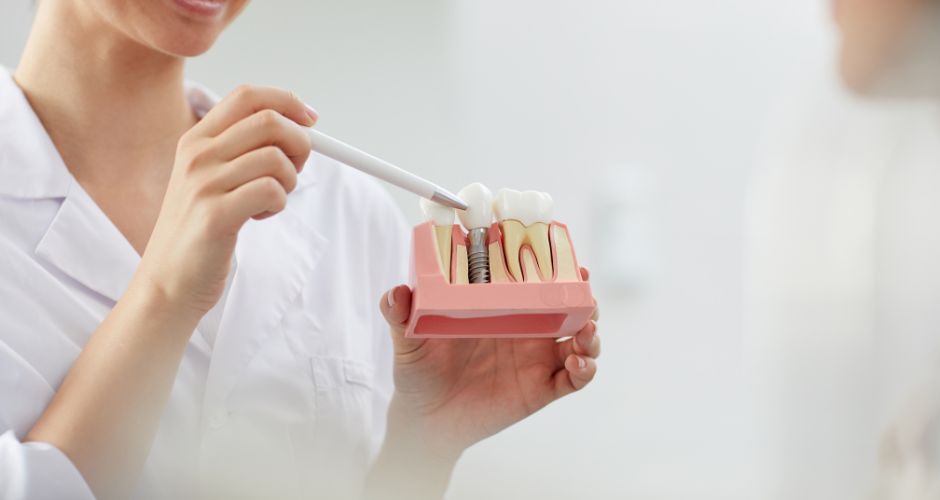Transforming Smiles with Dental Implants

Ever wondered about the remarkable evolution of dental implants, which have become a game-changing solution for millions seeking to enhance their smiles and boost self-confidence? Dental implants represent a groundbreaking advancement in modern dentistry, offering a long-term solution to dental issues and missing teeth.
This comprehensive guide will thoroughly explore various facets of dental implants, including their definition, advantages, lifespan, and maintenance. We will also delve into the cost of dental implants, their suitability for seniors and young children, and the surprising connection between dental implants and improved oral health.
Dental Implants: The Foundation of Transformation
Let’s begin by understanding the basics of dental implants to grasp how they can enhance smiles. Dental implants are synthetic tooth roots typically crafted from titanium or other biocompatible materials. These implants are surgically embedded into the jawbone, providing a robust foundation for replacement teeth.
Unlike traditional dentures or bridges, dental implants offer a lasting and lifelike solution for missing teeth, revolutionizing dentistry by restoring not only smiles but also the ability to chew and communicate effectively.

Benefits of Dental Implants: Beyond Aesthetic Enhancement
Dental implants have become incredibly popular thanks to their many advantages. Let’s delve into some of these benefits:
- Longevity: When maintained properly, dental implants can endure for a lifetime.
- Natural Appearance: Implants resemble real teeth, enhancing the beauty of your smile.
- Improved Functionality: They enable you to enjoy your favourite foods with full chewing capability.
- Jawbone Preservation: Implants stimulate the jawbone, preventing bone loss often seen after tooth extraction.
- Enhanced Speech: Unlike conventional dentures, implants remain stable during speech, ensuring clear articulation.
- Oral Health Maintenance: Implants preserve your natural teeth without affecting neighbouring ones.
Lifespan of Dental Implants: A Long-Term Investment
Several key factors can influence the lifespan of dental implants. It’s important to be aware of these factors when considering the long-term success of your dental implant treatment:
- Oral Hygiene: Proper oral hygiene practices are paramount in maintaining the health of dental implants. Regular brushing and flossing, along with routine dental check-ups, help prevent issues like gum disease and infection that can compromise the longevity of implants.
- Health Conditions: Your overall health can impact the success of dental implants. Certain medical conditions like diabetes and autoimmune disorders may require special attention and care to ensure the implants integrate properly with the bone.
- Medications: Some medications can affect the healing process and integration of dental implants. It’s crucial to inform your dentist about any medications you are taking so they can plan your treatment accordingly.
- Bone Quality: The density and quality of the jawbone at the implant site play a significant role in the success of dental implants. Adequate bone density is necessary to provide a stable foundation for the implant. In some cases, bone grafting may be required to enhance bone quality.
- Smoking: Smoking is known to be detrimental to oral health and can increase the risk of implant failure. Smoking can impair the healing process and reduce the longevity of dental implants. Quitting smoking or avoiding it altogether is advisable for implant candidates.
- Dental Habits: Avoiding harmful dental habits like teeth grinding (bruxism) and chewing on hard objects is essential to protect the integrity of dental implants. These habits can exert excessive force on the implants and may lead to complications.
- Proper Restoration: The quality of the restoration placed on top of the dental implant is crucial. Well-crafted crowns, bridges, or dentures that are properly fitted and maintained can significantly contribute to the long-term success of the implant.
- Follow-Up Care: Regular follow-up visits to your dentist are essential for monitoring the health of your dental implants. Any issues or complications can be addressed promptly, increasing the chances of a long and successful implant lifespan.
- Age: While dental implants are a viable option for individuals of various ages, the overall health of the patient is more important than age alone. Seniors can also benefit from dental implants and enjoy their long-lasting advantages.
- Diet and Nutrition: A balanced diet that supports overall health, including the health of your teeth and gums, can contribute to the longevity of dental implants. Adequate nutrition supports the healing process and maintains oral health.

Maintenance of Dental Implants: Tips for Proper Care
Properly maintaining your dental implants is vital for their long-term success and functionality. Here are essential maintenance practices to adhere to:
- Oral Hygiene: Maintain a consistent oral hygiene regimen to keep your dental implants clean and plaque-free. Brush your teeth a minimum of twice daily using a soft-bristle toothbrush. Use a low-abrasive fluoride toothpaste to prevent surface damage to the implant. Daily flossing is crucial to remove food particles and plaque from between your natural teeth and around the implant.
- Regular Dental Check-Ups: Follow your dentist’s recommendations for scheduling and attending routine dental check-ups. These appointments are critical for monitoring the condition of your dental implants and detecting potential issues early. Additionally, your dentist will conduct professional cleanings to ensure the area surrounding the implants remains in optimal health.
- Avoid Harmful Habits: Steer clear of habits that can damage dental implants, such as teeth grinding (bruxism) and chewing on hard objects. If you have a history of teeth grinding, your dentist may recommend a nightguard to protect your implants while you sleep.
- Quit Smoking: Smoking can have a detrimental effect on oral health and the success of dental implants. Smoking impairs the healing process, increases the risk of infection, and may lead to implant failure. Quitting smoking or avoiding it altogether is highly advisable for implant recipients.
- Healthy Diet: Maintain a balanced diet rich in essential nutrients to support overall health, including oral health. Adequate nutrition promotes proper healing and tissue maintenance around the implant site.
- Alcohol Consumption: Limit alcohol consumption, as excessive alcohol can have adverse effects on oral health. Alcohol can contribute to dry mouth, which may increase the risk of dental issues.
- Regular Cleaning of Dental Prosthetics: If your dental implants support removable prosthetics like dentures or bridges, clean them thoroughly as instructed by your dentist. Proper cleaning and maintenance of these prosthetics are essential to prevent bacterial growth and maintain their fit.
- Mouthwash: Consider using an antimicrobial or fluoride mouthwash as recommended by your dentist to help maintain oral hygiene and reduce the risk of infection.
- Follow Dental Recommendations: Follow any specific care instructions provided by your dentist or oral surgeon. They may recommend special cleaning tools or techniques tailored to your individual needs.
- Stay Informed: Stay informed about the latest advancements in dental implant care and maintenance. Your dentist can provide updates on best practices and any new technologies or products that may enhance your implant care routine.
Yoy may like Caring for Your Oral Health During Pregnancy
Cost of Dental Implants: An Investment in Your Smile
Dental implants have transformed the field of dentistry by offering a durable and reliable solution for missing teeth. While renowned for their functional and aesthetic benefits, many wonder about their cost, which can vary based on several factors:
- Number of Implants: The cost increases with the number of teeth to be replaced.
- Implant Material: Some may opt for alternative materials, affecting the price.
- Implant Type: Different implant types, such as regular, micro, or All-on-4, come with varying costs.
- Preparatory Surgeries: Additional procedures like bone grafting can influence the overall price.
- Location: Dental service costs can vary by region and provider.
Age Is Not a Barrier: Seniors and Dental Implants
Oral health becomes increasingly important as we age, and tooth loss among seniors is common. Despite various tooth replacement options, dental implants stand out as a robust and practical solution. Benefits for seniors include:
- Jawbone Preservation: Implants stimulate the jawbone, maintaining facial structure and oral health.
- Durability: Properly maintained implants can last a lifetime, reducing replacement costs.
- Natural Feel and Function: Implants closely mimic natural teeth, allowing seniors to enjoy their favourite foods and speak confidently.
- Oral Health Maintenance: Easy-to-care-for implants reduce infection and gum disease risks.
- Enhanced Confidence: A beautiful and functional smile boosts self-esteem and social interactions.

Considerations for Seniors
Seniors considering dental implants should discuss their general health with a dentist, as certain medical conditions may need special consideration. Medications can affect implant healing, and bone density should be evaluated. Regular dental checkups are crucial for implant maintenance.
Children’s Dental Implants: Solutions for Young Smiles
Tooth loss in children due to accidents, trauma, or congenital issues can pose challenges. Dental implants offer a safe and long-lasting replacement solution. Factors to consider for children include:
- Age-Related Factors: Consultation with a pediatric dentist or oral surgeon helps determine the right time for implants, usually in late adolescence.
- Bone Development: Adequate bone growth is essential for successful implantation, requiring X-rays and assessments.
- Commitment to Oral Hygiene: Both parents and children must maintain proper oral hygiene for implant health.
- Mental Preparation: Children should be mentally prepared for the surgical procedure and recovery, with open discussions about the process.
Benefits of Pediatric Dental Implants
Pediatric dental implants offer several advantages, including:
- Functional Restoration: Dental implants enable children to eat, speak, and smile normally, similar to natural teeth.
- Preventing Dental Problems: Implants prevent issues like bone loss and alignment problems associated with tooth loss.
- Long-Term Solution: With proper care, dental implants can last a lifetime, eliminating the need for frequent replacements.
- Increased Self-Esteem: A full, genuine smile enhances a child’s confidence and social interactions.
- Improved Speech: Dental implants support clear speech and proper pronunciation.
Give a look Common Dental Problems and How to Prevent Them
Dental Implants and Improved Oral Health

Oral health requires careful attention and sometimes interventions like dental implants, which play a crucial role in overall health. Dental implants offer multiple benefits to oral health:
- Jawbone Density Maintenance: Implants stimulate the jawbone, preserving its integrity and facial structure.
- Preventing Teeth Shifting: Implants prevent neighbouring teeth from shifting, maintaining dental alignment.
- Enhancing Digestion and Chewing: Missing teeth can affect digestion, and implants restore proper chewing function, promoting better food absorption.
- Voice Enhancement: Dental implants support speech articulation, leading to clearer communication.
- Permanent Solution: Unlike removable dentures, implants offer a long-term solution, minimizing ongoing dental procedures and expenses.
- Increased Self-Confidence: A full smile boosts self-esteem, promoting comfortable social interactions.
- Easy Maintenance: Dental implants fit seamlessly into regular oral hygiene practices, requiring only brushing, flossing, and routine dental checkups.
Conclusion: Transforming Your Smile
Dental implants have revolutionized dental care by providing a durable and lifelike solution for missing teeth, positively impacting countless smiles and lives. With their myriad benefits, longevity, and oral health advantages, dental implants appeal to individuals of all ages. Recognizing the transformative potential of dental implants is the first step toward a healthier, more confident smile, whether you’re considering them for yourself or a loved one. Embrace the possibilities and embark on the journey to a new smile with dental implants.





